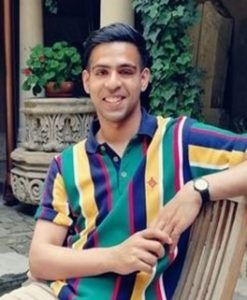An Interview with… Arbaz Kapadi
Can you tell us about yourself?
Hi everyone! I’m Arbaz, and I am a Research Associate in the Division of Psychology and Mental Health. I joined the department in 2022 (so I don’t think I’m new?) just as I was nearing the completion of my PhD.
I’ve taken bit of a journey on my short-ish academic career to date, which has involved moving across a few disciplines. I began with a BSc in Clinical Sciences, which you would very much describe as ‘hard sciences’ – human anatomy, physiology, bit of chemistry in there. At one point, I could name all the important drugs/muscles/bones without batting an eyelid (don’t ask me now). Interestingly, nestled between all this science-y stuff was a short module on Health and Society (in my second year), which I took to straight away. I was (and continue to be) fascinated by the complexity of healthcare – culture, behaviour and how highly connected systems of people, resources, processes and institutions come together to deliver care with wide-ranging consequences. I ran with this interest and completed a Masters in Public Health where I focused on areas like health promotion and inequalities. At the time, I’d also been volunteering with Healthwatch, with the aim of strengthening the voice of patients and the public in the design and delivery of services. I think that combination of interests led to pursuing a PhD (after a mini-break) at which time, I found myself based in a Management School. My PhD was an collaborative ESRC studentship with a broad aim to examine healthcare quality improvement efforts. I shifted the focus a little to explore how spaces of quality improvement factored in the role of patients using disability and mental health services. I approached this through a sociological lens of power (think Foucault, Bourdieu, Fricker) as I found this explained, certainly to me, a lot of what framed policy direction and the various stakeholder relationships and behaviours.
Currently, I am interested in research that explores how care, or a particular intervention, is deemed effective. That is from understanding what the rationale or evidence is informing the design through to how uptake is translated into practice. Within that, exploring the roles of different stakeholders in this process, what conversations are taking place, trying to make sense of different views, and how this all influences what is implemented in practice – almost comparing the rhetoric versus reality.
What drew you to doing research?
In the ‘informal’ sense, I have been involved in research for as long as I remember even though I didn’t see it like that. Growing up, I’d been part of numerous community/youth groups with the sole intention of trying to better the communities we lived in. This involved speaking to local communities, documenting their stories and trying to create an impact from that. I guess my academic choices have almost formalised that route into research. I think research is key to making a positive difference on people’s lives and situations, and having the opportunity to be part of this field can be exciting and fulfilling. Equally, you get the opportunity to meet, speak and collaborate with new people, expand your vision, challenge assumptions etc.
What do you enjoy about your job/role?
I am currently enjoying the diversity of work in which I am involved. For example, I am currently exploring an intervention in radiotherapy which involves speaking to healthcare staff. At the same time, I am involved in research with patients looking at consent and the ethics of involvement. Slightly away from this, I am involved in a study around the impact of urban regeneration and that again has involved speaking to different groups of people and using different methods. So, yes that diversity – it can be a challenge but does keep it exciting. I have also noticed a lot of personal development as a result and that has been equally refreshing.
What can you share with us in terms of failing and what that has taught you?
I have had my fair share, and even worse, feeling that you are failing when you are not. Trying to do a PhD during the COVID period was not the most ideal and as you can imagine brought about a host of challenges. Normalising failure helps – everyone has experienced it (irrespective of where they are), and a lot of the time, there are stuff out of your control, so acknowledging that as part of the process helps. I have found it helpful to speak to people regarding failures rather than keeping them to yourself because, for example, you feel you might get judged. Everyone is on their own journey. At the same time, make sure you celebrate your successes, no matter how small. Not advocating this at all (I can feel the supervisors’ wrath), but I use to take the day off when I had a positive PhD supervisor meeting.
Any advice or tips to current students?
Confidence and belief in yourself are vital. I guess, some of the more academic skills can be taught and learnt, but keeping a handle on this can admittedly be difficult. To some extent, this covers the question above, but acknowledging that you are on a unique journey and that you are where you are on merit. Also, feel safe to ask ‘stupid’ questions because I bet you someone else is thinking the same.
How do you unwind from work?
I am a big sports fan, in particular, football. I am a big Utd fan (even though I’m from Blackburn, don’t judge) and try to watch them when I can. I was fortunate to go to the last World Cup which was an experience. I play for a local team – well, amble around and bark orders at everyone whilst contributing little. I coach an Under-18s team, which has brought more unnecessary stress than anticipated (we do get the odd win!). Also, I’ve been told it’s a hobby, but I just seem to have accumulated a lot of football shirts over the years (around 120 at last count) so it would be rude to stop… I guess.








0 Comments